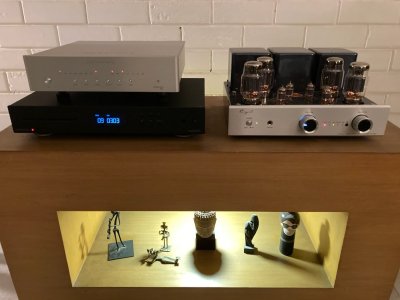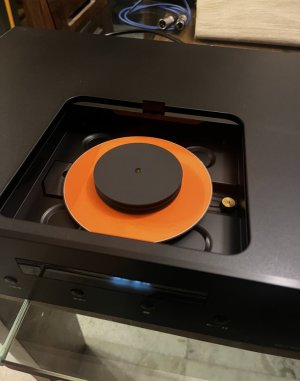It’s been roughly a year and a half since I put together my current setup, and all was well in audioland. Then I got a cheque in the mail.
Apparently, in a rare display of intelligence, young coaltrain had invested in a PF fund some twenty years ago. And then promptly forgotten all about it. So now the older me had to deal with this windfall, and that could only mean one thing… it’s upgrade time!
Of course, there really was no need for me to upgrade anything. I was perfectly happy with my setup, and I’d been steadily growing my collection of CDs. But, as we all know, upgraditis attacks the brain cells first. Common sense goes out the window and convoluted rationalization takes over.
Say hello to my new friend: the Denafrips Pontus 12th.

I did (very) briefly consider the Gustard R26, but I’ve been digging the Ares II for far too long. Sticking with the Denafrips’ sonic signature made the most sense. And it’s worked out beautifully.
The Pontus takes all the positive qualities of the Ares and cranks it up to 11. The most immediately obvious improvements are in bass depth and definition, instrument separation and soundstaging. Which means that the system’s basic character has not changed, it’s just gotten better.
So, what’s next? How about a top loading transport like the Jay’s Audio CDT? Or the new Wharfedale Dovedales? Or both?
Ah well, in a moment of sanity, I reinvested everything. So I’m quite happy… for now
Apparently, in a rare display of intelligence, young coaltrain had invested in a PF fund some twenty years ago. And then promptly forgotten all about it. So now the older me had to deal with this windfall, and that could only mean one thing… it’s upgrade time!
Of course, there really was no need for me to upgrade anything. I was perfectly happy with my setup, and I’d been steadily growing my collection of CDs. But, as we all know, upgraditis attacks the brain cells first. Common sense goes out the window and convoluted rationalization takes over.
Say hello to my new friend: the Denafrips Pontus 12th.

I did (very) briefly consider the Gustard R26, but I’ve been digging the Ares II for far too long. Sticking with the Denafrips’ sonic signature made the most sense. And it’s worked out beautifully.
The Pontus takes all the positive qualities of the Ares and cranks it up to 11. The most immediately obvious improvements are in bass depth and definition, instrument separation and soundstaging. Which means that the system’s basic character has not changed, it’s just gotten better.
So, what’s next? How about a top loading transport like the Jay’s Audio CDT? Or the new Wharfedale Dovedales? Or both?
Ah well, in a moment of sanity, I reinvested everything. So I’m quite happy… for now


